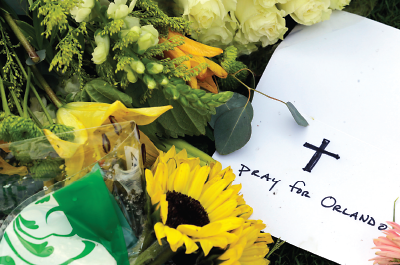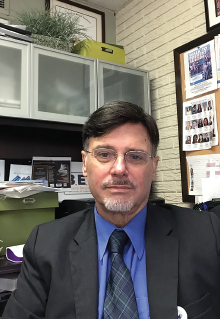Florida Psychiatrists Respond to Orlando Nightclub Shooting
Abstract
The Florida Psychiatric Society rallies to help survivors and families after the Orlando nightclub massacre.
The murders at the Pulse nightclub in Orlando, Fla., early on Sunday morning, June 12, left 49 patrons dead, 53 wounded, and yet another city in shock. The carnage was the largest mass shooting in American history.

A “Pray for Orlando” card sits in a makeshift memorial outside the Dr. Phillips Center for the Performing Arts for victims of the fatal shootings at the Pulse Orlando nightclub on June 13 in Orlando, Fla.
Suggested motives of the gunman, Omar Mateen, who was eventually killed by police, ranged from anger against gays to his declaration of allegiance to the Islamic State (ISIS) during the attack.
The event was shocking not only in its scale but in its effects on the larger communities from which its targets came. And like previous tragedies, it drew a local and national response to care for survivors, for victims’ families, and for those broader communities.
“We are working to get as many local volunteers for both acute and longer-term needs,” said Florida Psychiatric Society (FPS) president Abbey Strauss, M.D., of Boca Raton.
The Pulse was a gay club, and the lesbian, gay, bisexual, and transgender (LGBT) community was deeply shaken, as was the Hispanic community—it had been Latino Night at the club, and the dead were overwhelmingly Hispanic.
“The Orlando Chapter of the FPS, including some area Hispanic psychiatrists, acted without delay to offer timely and effective volunteer services to the survivors and the family members of the victims,” said APA Assembly Hispanic Caucus Representative José E. De La Gándara, M.D., of West Palm Beach, Fla.
“The horrific criminal act that took place in Orlando is a sobering reminder about the dangers of fanatic intolerant hate, whether inflicted on gays or other racial, ethnic, or religious groups in our society or anywhere else in the world.”
The effect on the LGBT community across the country was “terrifying,” said Michael Leslie, M.D., medical director of the Dissociative Disorders and Trauma Program at McLean Hospital in Belmont, Mass. “Prejudice is real, and it is still dangerous to be LGBT in America.”
It also raised questions about gay places usually perceived as safe, like gay bars or specialized medical clinics, said Leslie, who is also director of LGBTQ Mental Health Initiatives at McClean.
Now many gays wonder whether they will be more vulnerable in public spaces, said Leslie. “The victims were not randomly chosen.”

The quick politicization of the murder of 49 Orlando club goers, rather than emphasis on community recovery, concerns Edward Kantor, M.D.
Unease and fear had rippled nationally throughout the LGBT community almost overnight, said Edward Kantor, M.D., an associate professor of psychiatry at the Medical University of South Carolina in Charleston.
“Mainstream society had started to support previously marginalized minority populations in ways that may not have happened outside of a tragic event,” said Kantor, who is also disaster chair of the South Carolina Psychiatric Association and who participated in the response to the Virginia Tech shooting in 2007 and last year’s Mother Emanuel AME Church shooting in Charleston. “If there is a shred of something good beyond the horror for the populations most affected, the Pulse shooting perhaps may serve as a catalyst that allows people of different backgrounds to see each other in more similar, more human ways.”
In the initial days after the crime, FPS members worked with the Zebra Coalition, a network of organizations that provide services to LGBT youth, said FPS Executive Director Margo Adams. “We’re trying to connect with and support existing local mental health structures rather than duplicate services.”
What made the psychiatric response to the Pulse attack fast and effective was that the FPS’s disaster committee has had close connections for 15 years with the mayor’s office and law enforcement officials in the Orlando area, said Richard Hall, M.D., a professor of psychiatric education at the University of Central Florida in Orlando and chief of the forensic and disaster committees of the Florida Psychiatric Society.
“Response plans were thorough and well worked out,” said Hall in an interview.
Mental health professionals of all kinds volunteered their services afterward, said Hall. Area psychiatrists offered counseling for victims and their families.
“However, the real problems will come two to four weeks down the road as stress reactions set in,” he said. “Many people will start to be seen by their primary care physicians with somatic complaints.”
The city opened a one-stop family assistance center in a football stadium. Activities there were coordinated by the FBI’s Office for Victim Assistance and included not just crisis counseling services but also legal aid, transportation, funeral assistance, and other services, said Manal Durgin, M.D., medical director at the Devereux Advanced Behavioral Health in Melbourne, Fla., a nonprofit agency that provides mental health treatment to people with psychiatric and neurodevelopmental conditions. Devereux also offered use of its mobile crisis response team, which serves the Orlando area.
Other FPS members worked in the days after the shooting with the mayor’s office to assist citizens who are calling for help. Psychiatrists from elsewhere in the state also are likely to become involved, since club patrons were not only from the Orlando area.
The FPS received advice and information from APA’s Committee on the Psychiatric Dimensions of Disaster and its chair, Robert Ursano, M.D., as well as from other members with experience in disaster response.
“Whenever an event strikes close to one’s own experience, it can arouse associated memories and feelings, especially for families who lost people they love,” said Steven Marans, Ph.D., of the Yale Child Study Center, who was involved in the long-term response to the Sandy Hook Elementary School shooting in 2012 in Newtown, Conn.
Reactions were muted in other cities like Newtown that experienced mass shootings in recent years.
“It’s still too early to tell how people will react here in Boston, but some of our patients with PTSD are reporting hypervigilance and avoiding public spaces,” said Leslie, who was a block away from the bomb blast at the Boston Marathon in 2013.
The early wave of volunteers in Orlando was heartening, but some caution is in order, as well, said Charles Herrick, M.D., chair of psychiatry at Connecticut’s Danbury and New Milford Hospitals, who was also at Newtown.
“I learned from our own experience that there’s a rush to come in to help the community,” said Herrick. “But that can do more harm than good because then the community has to manage the outside world, as well. It’s better to rely on community services, since they will carry on the work once the outside attention is gone.”
Leslie also advised clinicians who were helping survivors and families not to ignore their own stresses.
“Providers need to be aware of the burden on them to sit with people and listen to their terror and pain as they search for meaning,” he said. “It’s important when working with survivors to focus on self-care as a means of helping the client.”
“Mass shootings are a far-too-common form of terrorism in our nation,” cautioned Ursano. “Terrorists attack the fault lines in our society, at the boundaries of sexual orientation or race or ethnicity or religion, so it’s important for our nation and our communities to stand together.” ■



